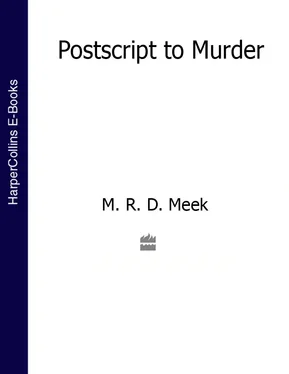The letters were typewritten on plain paper torn off the kind of pad available at any stationers. The typing had the pepper-and-salt look made by a two-fingered typist, but that too could be misleading – any expert can imitate an amateur. The machine was manual not electronic, black carbon ribbon, the alignment fairly even with no smudging of the e’s and o’s … Someone who kept the keys clean or did not use that particular typewriter very often?
Except for this kind of muck … Kemp sighed. He would hand the lot over to John Upshire tomorrow and let the police get on with whatever analysis they could make of such unpromising material. He had already made photocopies for himself. He shovelled the letters back into their envelopes, plain brown manilla, all addressed to himself, Mr Lennox Kemp, at his new home. He studied the postmarks, all different, all districts of London from the City to outlying suburbs, the malevolent missives had obviously been simply popped into pillar boxes wherever the writer fancied. None had been posted here in Newtown, but there was local knowledge; references to ‘your posh office’ … ‘I seen your glossy girls go in and out’ … (That had an almost poetic ring to it.) ‘Choke you to death in a gravel pit’ was an obvious pointer to the main industrial activity along this stretch of the River Lea …
Kemp tossed the bundle into his briefcase and put it in the hall ready for the morning.
Mary was down first. She felt the draught halfway up the stairs and saw that the front door was standing wide open. It was a strong old-fashioned door of solid oak but the lock too had been old-fashioned and all too easily shattered, expertly done – and quietly. Where the wood had burned in the previous day’s fire the bolts had not drawn across properly.
Kemp surveyed the damage, and shook his head.
‘We kept open house last night,’ he observed, gloomily.
His briefcase had gone. It was all that had been taken.
CHAPTER 3
‘So you’ve lost the evidence?’ John Upshire sounded more scornful than sympathetic.
‘Evidence of what? That someone hates my guts? I know what was in those letters – that’s enough for me. But there’s plenty of evidence for your men to get started on – a broken lock, an arson attempt and a stolen briefcase.’
‘All my sergeant’s got is a sackful of ashes … As for the breaking and entering, why’d they only pinch your case? Anything in it apart from the letters?’
‘Luckily, no.’ The inspector was just the man to assuage anger, it was part of his job. But even that habitual stolidity could do little to take away Kemp’s sense of outrage at what he saw as the violation of his home. He had been burgled before, both at his flat and in his office, and had accepted such happenings as part of modern living, but then he had been a single man … What rankled now was that he and Mary had been upstairs in bed, wrapped in sleep or other blessedness. It was as if a stranger had stood and watched them … He shook off such unproductive thoughts. ‘I don’t take so much work home with me since I married, and all our thief got was a pocket calculator and a folder of brochures on – of all things – security systems.’ He laughed. ‘Talk about locking the stable door – Mary and I were just about to have the whole house done.’
‘Well, it looks as if you’d better get on with it. I’ve had a word with the officer on patrol. Constable Barnes was in Station Road about midnight. There was a bit of a fracas at the Victoria pub but he soon cleared that up, and his beat would take him round your crescent in the early hours and he saw no one acting suspiciously – in fact, he saw no one at all though there’s the usual number of cars and vans parked … He wouldn’t have been able to see your front door anyway for all those damned bushes in your garden. Yes, I take your point about the fire, I don’t believe in coincidence either. Someone wants to scare you, they begin by letting you know how easy it is to get at you and your house is the obvious target. That and the letters … Just our luck they managed to pinch them back.’
‘Pure chance,’ said Kemp. ‘There’s no way they could know where they were. I think you’re right, breaking in that door and leaving it open was just a bit of showing off. They never went further than the outer hall, they spotted the case and simply lifted it, probably thought it would cause me embarrassment if I had clients’ files in it. Anyway, apart from the writer, no one knows such letters exist except Mary and myself, and now you.’
‘And I’ve not mentioned them to anyone on the force. I was waiting to get them to put them under the usual analysis. Well, we’ll just have to bide our time and see if you get any more of the same.’
‘I hope not,’ said Kemp, fervently. ‘Such vicious stuff has an unnerving effect on one. You and I can handle break-ins and burglaries, even that knock to my car if it was part of the whole scheme, because it’s men’s hands that wield the chisels or turn the steering wheel … Even pushing fire-lighters through the letterbox makes a loutish kind of sense. Plenty of our minor criminals get a kick out of bashing property – makes them feel bigger than they are. Vandalism grown up. But the letters, that’s something else again, the sheer malice behind them, the anonymity …’
‘Let me see your copies on Saturday evening,’ said John Upshire, briskly. ‘I’m still to come, am I?’
‘Of course you are. Mary’s not the kind to let this business get her down. Nor am I, if it comes to that – which is just as well for I’ve enough obsessed clients without becoming one myself.’
As he returned from the police station to his own office Kemp attempted to switch his attention from personal matters to the more pressing affairs of the practice. Despite recent shake-ups in the profession, Gillorns remained the eminent legal firm in Newtown, with a high reputation for probity and fairness, and Kemp was determined to keep it that way. Having over the past few years gathered round him not so much a team as a coterie of lawyers who worked in their separate fields but could stand together when required, he knew that he was the pivot of the firm, he held it together. Like John Upshire, not all of them had approved of his marriage, perhaps sensing a change in him. Despite their being friends as well as colleagues, he had spoken to none about the letters, for the animosity displayed in them seemed too personal – at least so far. But he knew how easily the reputation of a legal firm can be damaged when the character of any member is impugned, and there had been more than a hint of that behind the writing.
Had Kemp confided in anyone it would have been Tony Lambert of his Trusts department, who had a wise head on young shoulders, but Tony had recently become engaged to a pretty law student from Australia and it did not seem fair to intrude upon his present starry-eyed contentment. Michael Cantley’s insight into the thought processes (where such could be discerned) of Newtown’s up-and-coming young criminals might be of help should the scaring tactics be repeated, but in Kemp’s view the mind of the anonymous writer was of a different generation. Cantley had been with the firm for many years; he might yet have to be consulted if old files were to be exhumed. So might Perry Belchamber who had come over from the Bar and specialized in matrimonial matters; if, in the past, a troubled family had eaten bitter fruit, their children’s teeth could be set on edge …
Kemp couldn’t find the right quotation for that so he dismissed the whole matter of the letters from his mind and concentrated on Friday’s business.
There was no lack of it, despite the recession having trailed its dusty underskirts over all aspects. Instead of houses happily changing hands weekly on the new estates built in the boom years, now the property files were full of repossessions, and anguished cries from the building societies. ‘Ignore them as long as you can,’ Kemp told Charles Copeland, his conveyancing clerk. ‘Where there’s a roof there’s hope … I’d rather be blamed for the law’s delay than have families out on the street.’
Читать дальше












